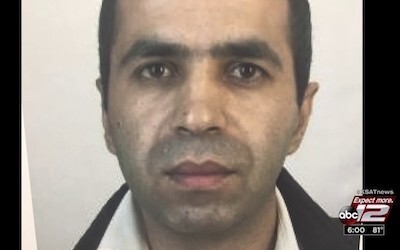On August 20, U.S. and Brazilian authorities announced the arrests of three operatives of a smuggling network charged with bringing “scores of individuals from East Africa and the Middle East, into Brazil, and ultimately to the United States.” |
U.S. homeland security agencies have long regarded illicit migration to U.S. land borders from Muslim-majority countries of the Middle East, South Asia, and North Africa as associated with the threat of infiltration by violent Islamic extremists. So much so that after 9/11, the U.S. government passed legislation that required smuggling interdiction programs to specifically counter long-distance smuggling networks that enable migration from such countries through Latin America.
One of the main efforts to reduce that risk was the deployment of ICE-Homeland Security Investigations (ICE-HSI) throughout Latin America, backed by the intelligence efforts of other outfits, such as the U.S. Southern Command, to take apart the long-haul human smuggling networks that routinely transport migrants from Muslim-majority nations to the southern border, including many flagged by intelligence reporting as terrorist suspects.
The last year has been particularly good for breaking smuggling rings connecting the Middle East to U.S. borders. |
The last year has been particularly good for breaking bridges that connect regions like the Middle East to America’s border. The most recent damage was doled out last week when Brazilian federal police in Sao Paulo rolled up three notorious smugglers: a Somali, an Algerian, and an Iranian based in Brazil. They were responsible for transporting immigrants from countries of national security concern to the U.S. southern border for years, including, according to Brazilian media, “two Somalis arrested by the US police over suspected terrorism”. Hence the homeland security importance of targeting special interest alien (SIA) smuggling networks like these.
The joint U.S.-Brazil investigation eventually showed the smugglers were producing counterfeit Brazilian visas and passports in eastern African countries for their paying customers, crossing them into Peru, and then taking them northward to the U.S.-Mexico border by bus, boat, and foot.
The investigation involved a variety of U.S. agencies with ICE-HSI and the Southern Command at the forefront, but was handed over for prosecution to the Brazilians, I’m told, so that country can put to use a new counter-smuggling law passed in 2017 as part of a national public security plan to counter transnational border crime. (See the section on Brazil in the U.S. State Department’s “Country Reports on Terrorism 2017" for more information.)
Investigations like this one in Brazil really matter to U.S. homeland security because that country has long been a primary staging ground for special interest aliens flown in from around the world for the northward trek to the American border.
This was only the most recent ICE-HSI counterterrorism coup that can only be said to have improved immigration security. Here are some others from the past year, some of which likely worked in concert with the three just busted in Brazil:
- A former Afghan interpreter for the U.S. Army, New Jersey resident Mujeeb Rahman Saify, was charged with crimes related to his facilitating the smuggling of at least two other Afghans to the Texas border, one of whom chose to enter this way because he had been terminated from Army service “for being a security risk based on his association with a foreign intelligence service.” Both of the smuggled Afghans actually made it over the Texas border.
- A Jordanian with dual Mexican citizenship based in Monterrey, Mexico, Moayad Heider Mohammad Aldairi, pleaded guilty to smuggling at least seven Yemenis over the Texas border, including “some ... on terror watch lists”. The Yemenis paid Aldairi thousands of dollars each to bring them into Texas over the Rio Grande and then dress like construction workers to avoid detection.
- A Brazil-based Somali smuggler, Mohamed Abdi Siyad, aka “Hassan,” was accused in a criminal complaint of transporting many dozens of Somalis and other Horn of Africa migrants — extremists potentially among them — from Africa through Latin America and on to both the California and Texas borders. Hassan reportedly is not in U.S. custody yet, but because of the ICE-HSI pressure, is out of service in Brazil and subject of an extradition process to retrieve him from Canada (probably a long story there).
- A notorious Costa Rican smuggler known as “Mama Africa,” who I’m told worked with the Brazilian smugglers and Hassan, was finally arrested after years of moving migrants from Muslim-majority nations as an important link in the smuggling chain. She and her family and associates moved migrants regarded as higher risk to Honduras by boat, then to Guatemala and Mexico.
- Operation Andes, an Interpol-led smuggling crackdown, netted 49 human smugglers who funneled people from Muslim-majority countries to South America, into Panama, and toward the U.S. border. According to a press release, four of the individuals arrested were linked to fraud, homicide, “and terrorism”.
Moayad Heider Mohammad Aldairi pled guilty to smuggling at least seven Yemenis over the U.S. southern border. |
The Brazil bust should be marked as another significant counter-terrorism/border security coup, because, especially taken together with other operations, it stems the flow of higher-risk migrants, at least for a time. Those who will undoubtedly step in, eventually if at all, to replace the arrested will know the heat is on with Brazil fully in the game and perhaps feel a need to take fewer clients and at a slower pace. All of that is better than allowing these kinds of smugglers to thrive on a feeling of impunity.
Todd Bensman is a fellow at the Middle East Forum and a senior national security fellow for the Center for Immigration Studies. Bensman previously led counterterrorism-related intelligence efforts for the Texas Intelligence and Counterterrorism Division (ICD) for nearly a decade.









